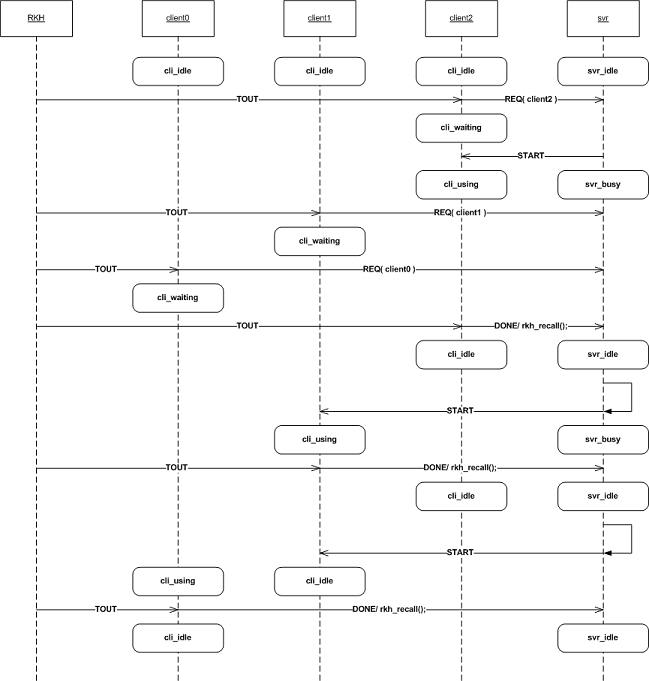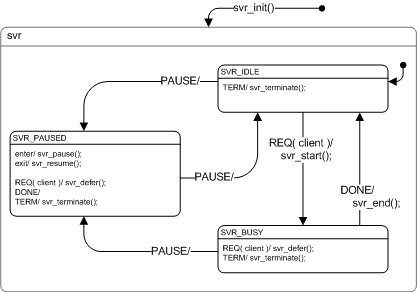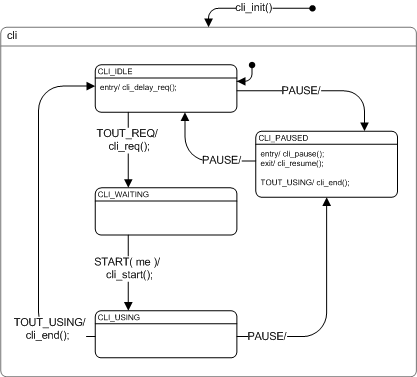Table of Contents

Prev: Cross-platform examples
This application deals with the shared resource problem in active object systems. Showing one of the biggest benefit of using active objects: resource encapsulation. The encapsulation naturally designates the owner of the resource as the ultimate arbiter in resolving any contention and potential conflicts for the resource. The shared application is relatively simple and can be tested only with a couple of LEDs on your target board. Still, Shared contains five (5) concurrent active objects that exchange events via direct event posting mechanism. The application uses four timers, as well as dynamic and static events. On the other hand, this application could be used in either preemptive or cooperative enviroment. Aditionally, the Shared could be used to verify a new RKH port.
The platform-independent Shared source code (in C) is located in the <rkh>/demo/cross/shared/ directory, where <rkh> stands for the installation directory chosed to install the accompanying software and client.h, server.h, shared.h, client.c, main.c and server.c are the platform-independent files. Thus, the code is actually identical in all Shared versions, such as the Windows version, S08 version, and so on.
- Sequence diagram
- State machines
- Signals, events, and active objects
- Initializing and starting the application
- Running on various platforms
Sequence diagram
The sequence diagram in Figure 1 shows the most representative event exchanges among three Clients (cli0, cli1, cli2) and the Server (svr) active objects.
The server shares their resource with clients. A client does not share any of its resources, but requests a server's content or service function. Clients therefore initiate communication sessions with the server which await incoming requests. The server selectively shares its resource; and a client initiates contact with the server in order to make use of the resource. Clients and server exchange messages in a request-response messaging pattern: The client sends a request, and the server returns a response.
As an additional feature, the Clients can be paused for an arbitrary period of time. During this paused period, the Clients don't get permissions to request. After the pause period, the Clients should resume normal operation.

State machines
Figure 2(a) shows the state machine associated with Client active object, which clearly shows the life cycle consisting of states "cli_idle", "svr_paused", "svr_waiting", and "cli_using". See Client state-machine implementation section.

Figure 2(b) shows the state machine associated with the Server active object, with "svr_idle", "svr_paused", and "svr_busy" states. See Server state-machine implementation section.

- Note
- The notation of UML Statecharts is not purely visual. Any nontrivial state machine requires a large amount of textual information (e.g., the specification of actions and guards). The exact syntax of action and guard expressions isnt defined in the UML specification, so many people use either structured English or, more formally, expressions in an implementation language such as C [Douglass]. In practice, this means that UML Statechart notation depends heavily on the specific programming language.
Client state-machine implementation
The client.c file implements the state machine of Client active object, which illustrates some aspects of implementing state machines with RKH framework. Please correlate this implementation with the state diagram shown above. On the other hand, the header file client.h contains the definitions of object structures related to the state machine. See the following sections:
"client.c" - Client active object implementation
Prev: Client state-machine implementation
"client.h" - Client active object specification
Prev: Client state-machine implementation
Server state-machine implementation
The server.c file implements the state machine of Server active object, which illustrates some aspects of implementing state machines with RKH framework. Please correlate this implementation with the state diagram shown above. On the other hand, the header file svr.h contains the definitions of object structures related to the state machine. See following sections:
- Server active object implementation - "server.c"
- Server active object specification - "server.h"
"server.c" - Server active object implementation
/*2016.03.17 LeFr v1.0.00 Initial version//* -------------------------------- Authors -------------------------------- *//*LeFr Leandro Francucci lf@vortexmakes.com//* --------------------------------- Notes --------------------------------- *//* ----------------------------- Include files ----------------------------- */#include "rkh.h"#include "bsp.h"#include "shared.h"#include "server.h"/* ----------------------------- Local macros ------------------------------ */#define MAX_SIZEOF_QREQ (2 * NUM_CLIENTS)/* ......................... Declares active object ........................ */typedef struct Server Server;/* ................... Declares states and pseudostates .................... */RKH_DCLR_BASIC_STATE server_idle, server_busy, server_paused;/* ........................ Declares initial action ........................ *//* ........................ Declares effect actions ........................ *//* ......................... Declares entry actions ........................ */static void server_pause(Server *const me);/* ......................... Declares exit actions ......................... */static void server_resume(Server *const me);/* ............................ Declares guards ............................ *//* ........................ States and pseudostates ........................ */RKH_CREATE_BASIC_STATE(server_idle, NULL, NULL, RKH_ROOT, NULL);RKH_CREATE_TRANS_TABLE(server_idle)RKH_TRINT(TERM, NULL, server_terminate),RKH_TRREG(REQ, NULL, server_start, &server_busy),RKH_TRREG(PAUSE, NULL, NULL, &server_paused),RKH_CREATE_BASIC_STATE(server_busy, NULL, NULL, RKH_ROOT, NULL);RKH_CREATE_TRANS_TABLE(server_busy)RKH_TRINT(REQ, NULL, server_defer),RKH_TRINT(TERM, NULL, server_terminate),RKH_TRREG(DONE, NULL, server_end, &server_idle),RKH_TRREG(PAUSE, NULL, NULL, &server_paused),RKH_CREATE_BASIC_STATE(server_paused,server_pause, server_resume, RKH_ROOT, NULL);RKH_CREATE_TRANS_TABLE(server_paused)RKH_TRINT(REQ, NULL, server_defer),RKH_TRINT(DONE, NULL, NULL),RKH_TRINT(TERM, NULL, server_terminate),RKH_TRREG(PAUSE, NULL, NULL, &server_idle),/* ............................. Active object ............................. */struct Server{RKH_SMA_T sma; /* base structure */rui32_t ntot; /* total number of attended requests *//* number of attended requests of every client */rui32_t ncr[NUM_CLIENTS];};RKH_SMA_CREATE(Server, server, 0, HCAL, &server_idle, server_init, NULL);RKH_SMA_DEF_PTR(server);/* ------------------------------- Constants ------------------------------- *//* ---------------------------- Local data types --------------------------- *//* ---------------------------- Global variables --------------------------- *//* ---------------------------- Local variables ---------------------------- */static RKH_QUEUE_T queueReq;static RKH_EVT_T *queueReqSto[MAX_SIZEOF_QREQ];/* ----------------------- Local function prototypes ----------------------- *//* ---------------------------- Local functions ---------------------------- *//* ............................ Initial action ............................. */static voidserver_init(Server *const me, RKH_EVT_T *pe){rInt cn;RKH_TR_FWK_AO(server);RKH_TR_FWK_STATE(server, &server_idle);RKH_TR_FWK_STATE(server, &server_busy);RKH_TR_FWK_STATE(server, &server_paused);RKH_TR_FWK_SIG(REQ);RKH_TR_FWK_SIG(START);RKH_TR_FWK_SIG(DONE);RKH_TR_FWK_SIG(TOUT_USING);RKH_TR_FWK_SIG(TOUT_REQ);RKH_TR_FWK_SIG(PAUSE);RKH_TR_FWK_SIG(TERM);CSMA(0));RKH_CAST(Server, me)->ntot = 0;for (cn = 0; cn < NUM_CLIENTS; ++cn)RKH_CAST(Server, me)->ncr[cn] = 0;}/* ............................ Effect actions ............................. */static voidserver_start(Server *const me, RKH_EVT_T *pe){StartEvt *e_start;e_start = RKH_ALLOC_EVT(StartEvt, START, me);e_start->clino = RKH_CAST(ReqEvt, pe)->clino;RKH_EVT_CAST(e_start), me);bsp_svr_start(e_start->clino);++RKH_CAST(Server, me)->ntot;++RKH_CAST(Server, me)->ncr[CLI_ID(e_start->clino)];}static voidserver_end(Server *const me, RKH_EVT_T *pe){ReqEvt *e;(void)pe;!= (ReqEvt *)0){bsp_svr_recall(e->clino);}bsp_svr_end();}static voidserver_defer(Server *const me, RKH_EVT_T *pe){(void)me;rkh_sma_defer(&queueReq, pe);}static voidserver_terminate(Server *const me, RKH_EVT_T *pe){(void)me;(void)pe;rkh_fwk_exit();}/* ............................. Entry actions ............................. */static voidserver_pause(Server *const me){bsp_svr_paused(me->ntot, me->ncr);}/* ............................. Exit actions .............................. */static voidserver_resume(Server *const me){ReqEvt *e;!= (ReqEvt *)0){bsp_svr_recall(e->clino);}bsp_svr_resume();}/* ................................ Guards ................................. *//* ---------------------------- Global functions --------------------------- *//* ------------------------------ End of file ------------------------------ */void rkh_queue_init(RKH_QUEUE_T *q, const void **sstart, RKH_QUENE_T ssize, void *sma)Initializes the previously allocated queue data structure RKH_QUEUE_T.void rkh_sma_defer(RKH_QUEUE_T *q, const RKH_EVT_T *e)Defer an event to a given separate event queue.#define RKH_GET_SMA(_prio)Retrieves the address of an registered active object (SMA) according to its priority.Definition rkhsma.h:704RKH_EVT_T * rkh_sma_recall(RKH_SMA_T *me, RKH_QUEUE_T *q)Recall a deferred event from a given event queue.Defines the data structure used to maintain information about the queue.Definition rkhqueue.h:190
Prev: Server state-machine implementation
"server.h" - Server active object specification
Prev: Server state-machine implementation
Signals, events, and active objects
In RKH, signals are typically enumerated constants and events with parameters are structures derived from the RKH_EVT_T base structure. The next listing shows signals and events used in the Shared application (shared.h).
"shared.h" - Signals and events
Initializing and starting the application
Most of the system initialization and application startup can be written in a platform-independent way.
"main.c" - main() function
Running on various platforms
As said before, the only platform-dependent file is the board support package (BSP) definition. Each of supported platforms defines its own bsp.c and bsp.h files, which are contained in the proper directory, for example, the BSP for the Shared application on Windows 32 (Visual Studio 2008) with a simple cooperative scheduler is located in <rkh>/demo/cross/shared/build/80x86/win32_st/vc/
| CPU Architecture | Manufacturer | MCU | Evaluation Board | Toolchain | Comments | Notes |
|---|---|---|---|---|---|---|
| S08 | Freescale | S08QE128 | DEMOQE128 | Codewarrior v10.x | Native cooperative scheduler | |
| ARM-Cortex | Freescale | Kinetis K64 | FRDM-K64F | KDS | uC/OS-III on KSDK | |
| Native cooperative scheduler | ||||||
| Kinetis K60 | TWR-K60N512 | IAR v7.2 | uC/OS-III | Deprecated | ||
| Native cooperative scheduler | Deprecated | |||||
| 80x86 | — | — | — | Visual Studio C++ 2010 | Win32 cooperative scheduler simulation | |
| — | — | — | Visual Studio C++ 2010 | Win32 multithread |
Prev: Cross-platform examples